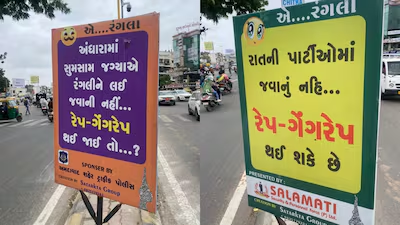A series of publicly displayed posters in Ahmedabad warning women to stay home at night to avoid rape has ignited fierce backlash, with citizens and activists accusing police of promoting victim-blaming under the guise of safety. Though removed after public uproar, the campaign has raised troubling questions about gender sensitivity in institutional messaging.
Blaming the Victim: Safety Advice or Social Regression?
Ahmedabad’s traffic police are under fire for sponsoring public posters that advised women to stay away from late-night parties and avoid venturing into isolated areas implying that doing so could invite rape or gang rape.
The bold messages—displayed in Gujarati and pasted across several neighborhoods like Sola and Chandkheda read phrases such as:
“Don’t go out at night… you could be raped” and “Going to parties can lead to gang rape.”
The posters bore the branding of a group called Satarkta and carried an official-looking label: “Sponsored by Ahmedabad Traffic Police.”
Residents, women’s rights groups, and social media users erupted in outrage, calling the campaign an alarming case of institutional victim-blaming disguised as safety education.
Authorities Backpedal After Public Outcry
As the controversy escalated, senior police officials rushed to distance themselves from the campaign. ACP Shailesh Modi and DCP Neeta Desai (Traffic West) acknowledged that permission was granted to Satarkta to conduct a safety campaign, but claimed they were unaware of the offensive language used.
“The posters have now been removed,” Modi confirmed. N.N. Chaudhary, an additional commissioner of police, clarified that while Satarkta had police permission to put up traffic awareness materials, the content itself was never vetted or approved.
The episode has exposed a lack of oversight in government partnerships and raised important concerns about the sensitivity and relevance of public safety messaging, especially concerning gender-based violence.
Women Speak Out: “Safety Doesn’t Mean Silencing Us”
The city’s residents, especially women, have spoken out forcefully against the narrative promoted by the posters. Dr. Bhumi Patel, a gynecologist and women’s rights advocate, questioned, “How could posters with such insensitive messaging that indirectly blame women for sexual violence go up under official sanction?”
Gayatri Shah, a fitness trainer from Bodakdev, pointed out how the posters diminished women’s autonomy. “They reduced safety to moral policing. Instead of promoting self-defense, accountability, and respect, they put the onus on victims.”
Other citizens took to social media, calling the posters “fear-mongering” and “an institutional way of saying ‘don’t exist in public spaces.’”
Minal Thakore, a resident of Naranpura, said the message reminded her of the archaic belief that women must regulate their behavior to avoid harassment, rather than society addressing the perpetrators of such crimes.
Key Takeaways:
- Issue: Public safety posters warned women against going out at night to avoid rape
- Location: Ahmedabad, Gujarat
- Sponsors: Traffic Police (via Satarkta Group)
- Backlash: Citizens, activists accused messaging of victim-blaming
- Police Response: Posters removed; officials claim content was unauthorized
- Public Reaction: Broad outrage on social media and among women’s groups



